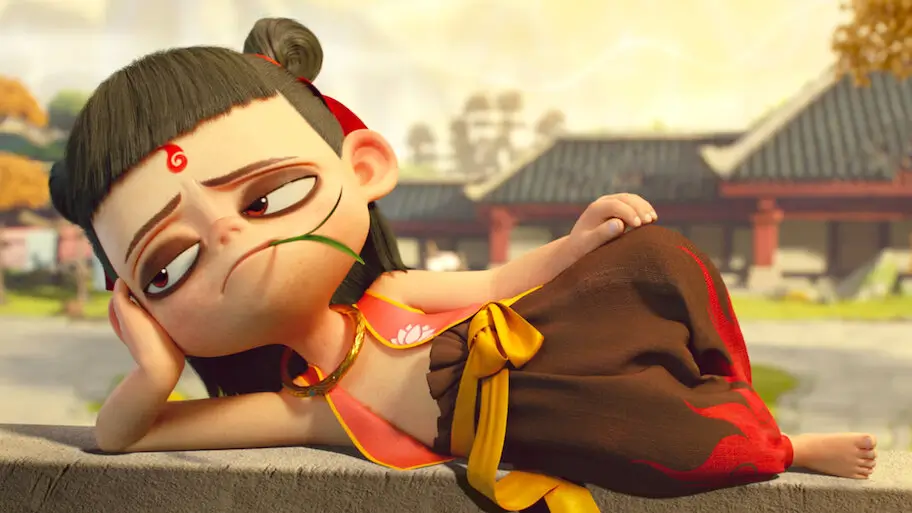The 2019 animated film Ne Zha quickly became a cultural phenomenon, not only in China but also on the global stage. Produced by Coloroom Pictures and written/directed by Jiaozi, the movie reimagines one of China’s most beloved mythological figures in a fresh and visually stunning way. With groundbreaking animation, a deeply emotional storyline, and universal themes, Ne Zha managed to resonate with audiences of all ages. This article explores the film’s plot, its connection to Chinese mythology, its thematic depth, and the reasons for its worldwide acclaim.
The Origin of Ne Zha in Chinese Mythology
Ne Zha is a legendary figure from Chinese folklore, often depicted as a rebellious child with supernatural powers. His story originates in the Ming dynasty classic novel Investiture of the Gods (Fengshen Yanyi), where he is portrayed as the son of a military commander who challenges the forces of evil.
Traditionally, Ne Zha’s tale involves conflict with the Dragon King, acts of defiance against unjust authority, and a tragic act of self-sacrifice. Over centuries, Ne Zha has become a symbol of youthful courage, rebellion, and the fight against destiny.
The Movie’s Fresh Interpretation
The 2019 film Ne Zha reimagines the myth while retaining its core essence. In this adaptation, Ne Zha is born under a cursed destiny. A prophecy foretells that he will bring chaos and destruction to the world. Because of this, the villagers fear and ostracize him, and his parents struggle between love for their son and fear of his potential fate.
The Central Conflict
The movie’s primary tension revolves around Ne Zha’s internal struggle: should he succumb to his “demonic” fate or fight to control his destiny? This conflict is intensified by the arrival of Ao Bing, the Dragon King’s son, who is also trapped by his own predestined role in the prophecy. Their eventual confrontation is not just a battle of power but also a clash of ideals.
Themes and Symbolism
The brilliance of Ne Zha lies in its layered storytelling. While it delivers fast-paced action and comedy, it also addresses deeper philosophical and emotional themes.
Defying Destiny
At its heart, Ne Zha asks the question: Can we truly change our fate? The film challenges the notion of predestination, suggesting that personal choices and determination play a greater role in shaping one’s future than any prophecy.
- Li Bing in White Cat Legend: A Character Analysis
- Redtooth in Killer Seven: A Deep Dive into the Mysterious Assassin
- Who Is the Villain in The Apothecary Diaries? Uncovering the Hidden Antagonists
- Which Studio Is Behind the Donghua Adaptation of Lord of The Mysteries?
- Dragon Raja Review: When the Worlds of Humans and Dragons Collide
Acceptance and Identity
Ne Zha’s journey is also about self-acceptance. Shunned by society and labeled as a monster, he must learn to embrace who he is and define his own identity. This theme resonates strongly with anyone who has ever felt misunderstood or judged unfairly.
Friendship and Empathy
The relationship between Ne Zha and Ao Bing is complex. Initially enemies, they eventually develop mutual respect and understanding. This evolution reflects the idea that empathy can bridge even the widest gaps.
Animation and Visual Style
One of the standout features of Ne Zha is its visual artistry. The animation blends traditional Chinese aesthetics with cutting-edge 3D animation techniques. From vibrant battle scenes to the subtle emotional expressions of characters, every frame is meticulously crafted.
The film’s use of color also plays a symbolic role. Ne Zha’s fiery red palette reflects his volatile nature, while Ao Bing’s icy blue tones embody his calm but constrained demeanor. The contrast between these two color schemes visually represents their conflicting paths.
Cultural Impact in China and Beyond
Upon its release, Ne Zha broke numerous box office records in China, becoming the highest-grossing animated film in the country at the time. It sparked widespread discussions about modernizing traditional folklore and opened the door for more Chinese animated features to reach global audiences.
Internationally, the film was praised for its universal themes, humor, and stunning visuals. It introduced many viewers to a cornerstone of Chinese mythology, fostering greater cultural exchange.
Lessons from Ne Zha’s Story
The film offers several takeaways that go beyond entertainment:
- You are not defined by others’ expectations.
- Change is possible through self-awareness and action.
- Empathy can transform relationships.
These messages, though rooted in a specific cultural context, have universal relevance.
Conclusion
Ne Zha is much more than a retelling of an ancient legend. It is a vibrant, emotionally rich film that blends tradition with innovation. By reinterpreting the classic story for modern audiences, it reinforces timeless values while pushing the boundaries of Chinese animation. Whether you are a fan of mythological tales, animation, or simply a good underdog story, Ne Zha is a film that leaves a lasting impression.
